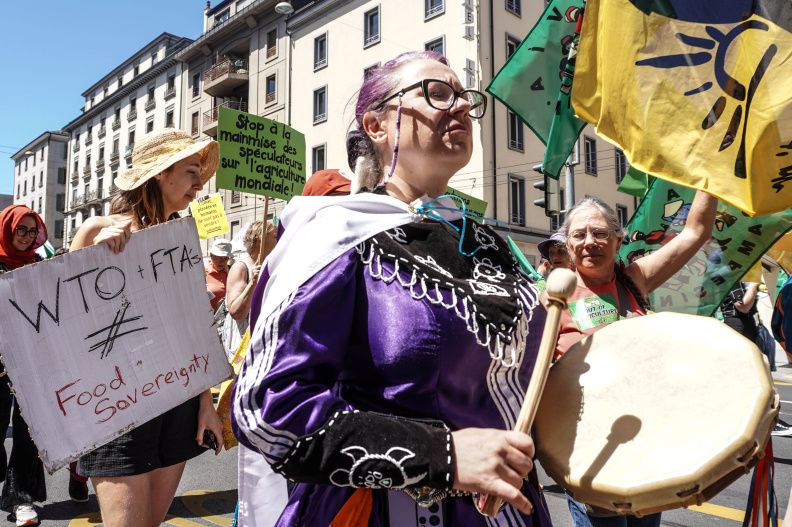10 September | Day of Action Against the WTO and FTAs: Statement of Organizations in Canada and the US

Political Statement of Organizations of La Via Campesina in Canada and the United States
On this International Day of Action Against the WTO and Free Trade Agreements, organizations of La Via Campesina in Canada and the United States – Family Farm Defenders, Farmworker Association of Florida, National Family Farm Coalition, National Farmers Union of Canada, and Union Paysanne- recommit ourselves to the struggle for food sovereignty here in North America and globally, in solidarity with our movement allies.
In the context of this Day of Action, we situate ourselves as farmers, farm workers, migrant farm workers, fishers, and Indigenous land stewards. We span generations and geographies, gender and sexual orientations and cultures. Yet, we gather on common ground to rise up against the ongoing dispossession violently imposed by free trade agreements. The current agricultural system aims to deliver cheap raw materials to satisfy the insatiable profit motive of multinational corporations at immense cost to the environment, eaters, and those who produce good, healthy food for our communities in line with food sovereignty and agroecology.
The natural tendency of the free market in agriculture is that the monetary value of agricultural products will consistently lag despite increases in costs of farming and living over time. This can only be exacerbated by free trade on a global scale. Without social regulation of agriculture, farmer and peasant incomes will always decline in real dollars, leaving farmers no choice but to “get big, or get out”.
The farmer who tries to be respectful of Mother Earth, livestock, and community values will always be at a disadvantage to farmers who chase more wealth, either for survival or greed, through destructive labor exploitation practices and externalized costs.
While we rightfully demand fair prices for farmers, and fair wages for food and farm workers, we must emphasize that cheap agricultural commodity prices invite multinational corporations to use these commodities unwisely for biofuels and industrial livestock factories. This, in turn, also allows these corporations to create unhealthy manufactured food with long shelf lives to be shipped all over the world.
We recognize that our democratic systems have been corrupted and do not represent grassroots demands for transformative social change, but instead their corruption plays favor to the corporate, global food system. Our struggle starts in our collective work to challenge our governments from the bottom up. To this end, we commit to working with LVC allies towards an alternative trade framework to the Agreement on Agriculture promoted by the WTO, one that promotes food sovereignty and aligns with the UN Declaration on the Rights of Peasants and Other People Working in Rural Areas.
We demand that the Canadian and United States governments break their ties with corporate agribusiness and neoliberal, unregulated trade and instead prioritize the rights and livelihoods of those who grow food in the context of mitigating the climate crisis, reversing biodiversity loss, and improving social stability.
At this conjecture, our movement in North America is in a process of rebuilding as we develop renewed decision-making, governance, and political processes. Using LVC’s bylaws to guide our work, we are strengthening our internal functioning. We are developing operational principles defining decision making and communication processes, leadership terms and responsibilities, conflict resolution and mutual accountability in our regional work. It is only with a strong foundation that we can work collectively towards a shared vision of food systems transformation in the face of intersecting crises.
As we fight corporate agribusiness in our food system, we draw strength from the comradery and collective power we are constructing through this global movement. North America is a distinct and critical region and our organizations are deeply committed with La Via Campesina family struggle, united in our diversities.
This post is also available in Español.
